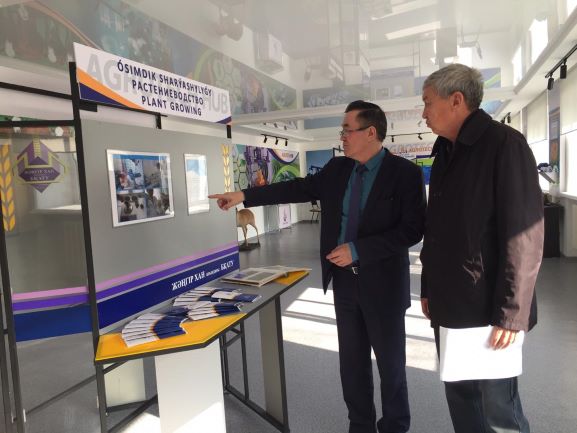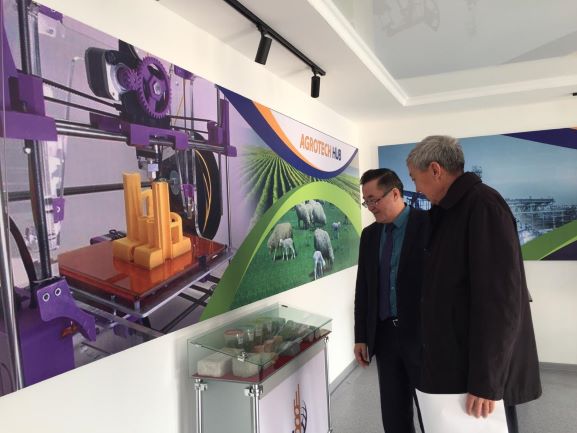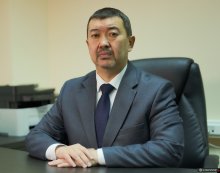
Agriculture is one of the most important sectors of the economy of Kazakhstan, which largely ensures the country's food security. But, despite the measures taken in the format of various programs of state support for farmers, there are still some issues in the agro-industrial complex that impede the active development of this sphere. One of the main issues the experts is called the remoteness of agrarian science and business from each other. The solution to this problem was called upon to be agrotechnical hubs, opening throughout the country on the basis of scientific centers and playing the role of guides between scientists and agricultural producers.
In March last year, office of “AGROTECH HUB” was created on the basis of a subsidiary of the “National Agrarian Science and Educational Center” JSC - Zhangir Khan West Kazakhstan Agrarian and Technical University. As noted by the rector of the Zhangir Khan WKATU, doctor of veterinary sciences, professor, academician Askar Nametov, “AGROTECH HUB” is a business platform for a constructive dialogue of all participants interested in the development of technologies and innovations, and a center for the commercialization of scientific developments, as it is called upon to assist not only in teaching new technologies, but also in their focused creation and transfer.
“AGROTECH HUB” also offers a combination of strategic business goals with technologies, so that one can achieve results as quickly and efficiently as possible. In general, the activities of the project office are based on such areas as technology transfer, training and consulting, creating conditions to support student ideas, conducting trainings on state support tools, processing and coordinating applications for innovative projects to be submitted to development institutions.

The head of "AGROTECH HUB" is a doctor of veterinary sciences, professor Kaysar Kushaliyev. According to the scientist, over the past time, more than 22 agricultural producers in the region came to the office for advice, 4 of them for laboratory research.
“Figuratively speaking, we bring science and business together,” Kaisar Kushaliyev emphasized. “We are being approached with a wide variety of questions: how to expand or open a business in the agricultural sector, people aske advice on improving the technological process to increase animal productivity or to provide consulting services for the prevention of infectious and invasive diseases. For example, recently the head of one of the peasant farms in the region asked about the possibility of rechecking the results of tests for brucellosis of cattle in the university laboratory. We carried out outreach with the owner of the cattle. Beginning farmers also come for advice on plant growing, our scientists can go to the fields to take the soil and test it for fertility, give recommendations on fertilizers and crop rotation. This year, scientists conducted similar soil analyzes for the Atyrau region, where the site selected by the farmer, unfortunately, turned out to be unsuitable for sowing forage crops,” said Kaisar Kushaliyev.
In addition, the project office works as a platform for scientists to communicate with agricultural producers, where they discuss and find ways to solve pressing issues in agriculture. “AGROTECH HUB” experts, jointly with university scientists, also conduct online consultations on crop production, agrochemistry, livestock and veterinary medicine, the economic sector, construction, etc.
According to the results of the first year of work of the “AGROTECH HUB” Zhangir Khan WKATU, the project office held 30 online consultations and seminars with the participation of 1282 students from among entrepreneurs from various fields of activity. In total, they asked 111 questions, 99 of which scientists proposed the practical solutions.

According to Kaisar Kushaliyev, in the near future within the framework of the “AGROTECH HUB” activity, it is planned to open such services as conducting classes on the Extension educational program for newcomers to agribusiness, introducing scientific developments of scientists in construction companies, creating a base of potato seed products for West Kazakhstan region and other regions, studying the agricultural market and compiling an interactive map, organizing paid courses for specialists of veterinary stations in the West Kazakhstan region and Atyrau region on the prevention of infectious and invasive animal diseases, joint trips with the inspectors of the hunting area of the West Kazakhstan region to saiga populations and comprehensive survey of saiga habitats of the Volga-Ural population .


